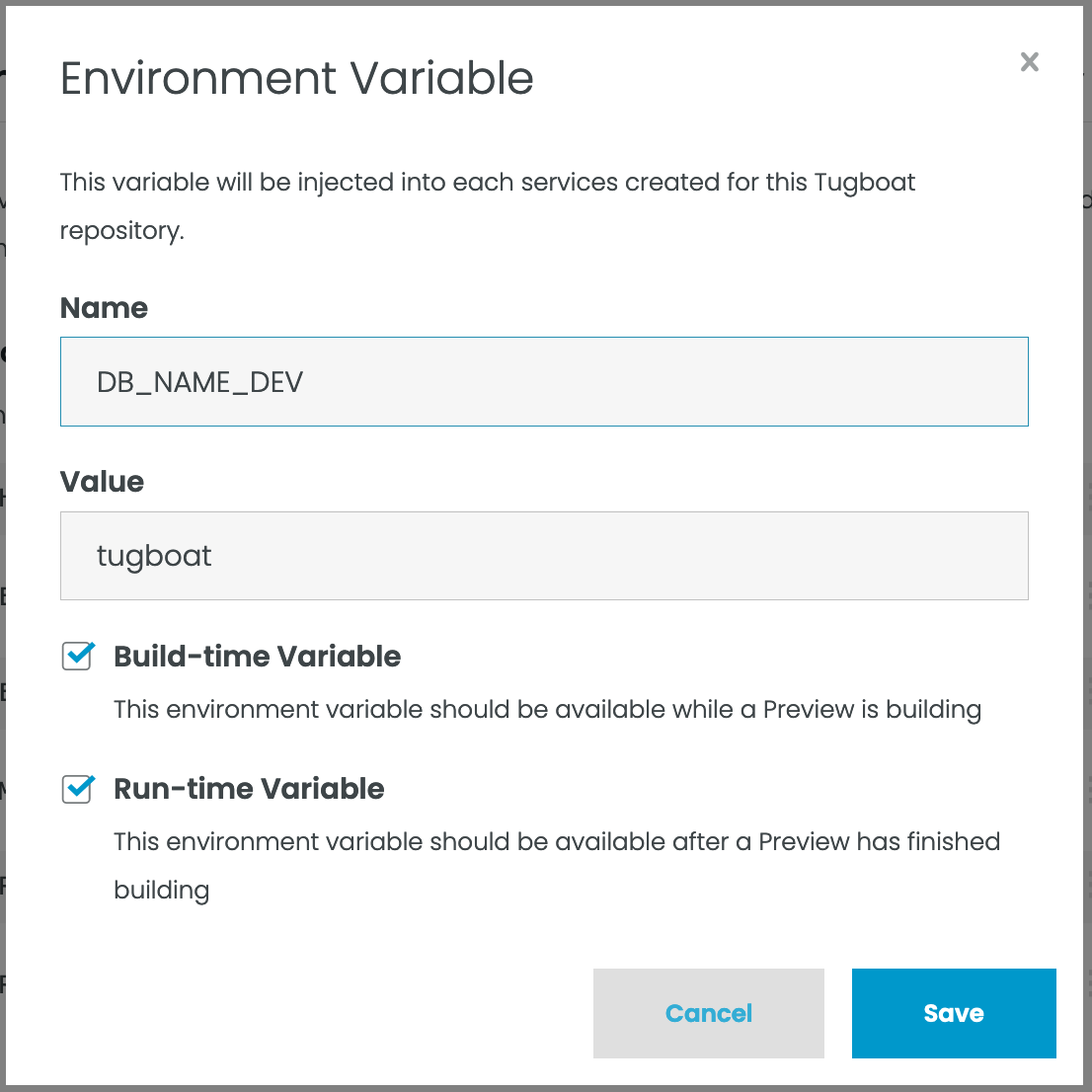Create Custom Environment Variables
Sometimes there are “secret” values or other data that you want to be made available to a Preview, but you don’t want to commit that data to git, and for security reasons, you don’t want to host it somewhere that Tugboat can grab it. These secret values usually include things like API keys to 3rd party services, or values used to encrypt session cookies that need to be unique to Tugboat but shared between your Previews.
Tugboat provides a convenient way of injecting these values into a Preview’s services via custom environment variables. These variables can be found on the Repository Settings page.
Info
Non-sensitive Environment Variables: If you need to set service-specific environment variables that are not sensitive (such as application modes, public URLs, or feature flags), you can define them directly in your config.yml environment configuration instead. This is often more convenient for non-secret values since they’re defined alongside your service configuration.
Like the other environment variables that Tugboat provides, the variables entered here are available to your Previews both while they are building as well as while they are running.
When you’re working with custom environment variables in Tugboat, you may want to:
- Limit environment variables to only be available at certain points in the build process
- Store complex data in a custom environment variable
Custom variable scopes
| Type | Scope |
|---|---|
| Build-time | Available to all command groups in config.yml (all stages of a Preview’s lifecycle) |
| Run-time | Available after a Preview has finished building. |
Define a scope for environment variable availability
For security reasons, you may want to limit the scope of environment variables containing sensitive data to only be available when they are needed. By default, Tugboat’s custom environment variables are always available, but you can define specific times in the build process for these variables to be available.
You can specify scope for environment variable availability in a few ways:
Specify environment variable availability scope via the Tugboat Repository Settings UI
When you go to add or edit a custom environment variable from the Repository Settings screen, you’ll see checkboxes where you can specify the envvar scope.
You can specify Build-time Variable, Run-Time Variable, both, or neither.
Specify environment variable availability scope via CLI or API
If you use the Tugboat CLI, you can specify the environment variable availability using arguments on
id=repository_id. The Tugboat CLI takes envvars, buildvars, and runvars arguments for global, build time, and
runtime variables.
Global environment variable example:
1tugboat update [repository_id] envvars=foo=bar,key=valueBuild-time-scoped environment variable example:
1tugboat update [repository_id] buildvars=foo=bar,key=valueRuntime-scoped environment variable example:
1tugboat update [repository_id] runvars=foo=bar,key=valueIf you’re using the API, you can pass an environment variable array, including scope, via the Create a Repository POST or the Update a Repository PATCH endpoints.
Storing Complex Data
Environment variables are good at storing simple string values. However, what if you need to store something more complex, like an encoded JSON string, or the contents of an arbitrary file? One way of accomplishing that is to base64 encode the value, and then decode the value with a configuration file command.
1$ cat file | base64
2Q2h1Z2dhIENodWdnYSBUdWdib2F0IQo=Store that value into an environment variable. Then, extract it to a file you can use in your Preview with something like the following:
1echo $VAR | base64 -D > /tmp/fileTroubleshooting
Variable not available
- If your Preview has commands in the
buildstage that rely on the newly-added variable, rebuild the Preview, and then variable will be available during the entire build process.

